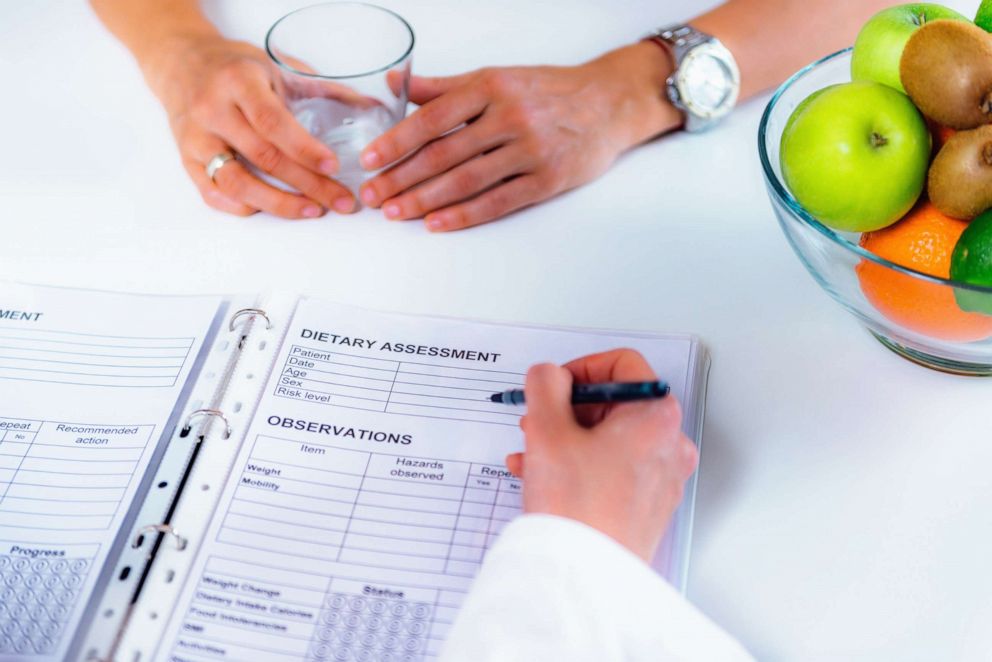With obesity on the rise, the best diet may be tailored to our genes, experts say
Here's why many expect nutrigenomics to be the future of nutrition.
With the COVID-19 pandemic drawing more attention to America's obesity problem, a growing body of research indicates that our genetics should be used to determine what we eat.
Decades of research shows that, at least for most people, the secret to staving off disease is getting plenty of exercise and eating diet high in vegetables and with a healthy mix of fats, protein and carbs. But now a budding field called "nutrigenomics" aims to offer people personalized lifestyle advice based on each person's DNA.
Though still a new area of scientific study, researchers hope food plans based on genetic makeups will be more effective than traditional one-size-fits-all recommendations.
"Given the greater concern for high blood pressure, high blood sugar and obesity, and their association with severe COVID-19, I foresee a great emphasis on personalized nutrition, with the use of data from genetic tests and monitoring blood glucose, to help people make positive choices and decrease their risk," said Brigid Titgemeier, a functional medicine dietitian and founder of beingbrigid.com.
It's not the supplements or the food that we eat, it's what the food does to our body to make it heal itself.
Decades after the Human Genome Project mapped the genes of humans, scientists now are using this information to better understand how food can modify predispositions to disease and immune functions.
Nutrigenomics is described as a genetic approach to personalized nutrition, including not just diet but sleep patterns and one's overall lifestyle.

"It embraces this idea that despite all of us being 99.9% the same, there is that 0.1% that truly determines how you respond to the world around you," said Dr. Yael Joffe, founder and chief science officer of 3X4 Genetics.
"Following a diet that is restrictive or one seen on social media may result in some improvement, but they aren't sustainable and aren't data driven," said Dr. Marvin Singh, an integrative gastroenterologist and founder of Precisione Clinic. "Nutrigenomics provides an understanding of your predispositions and deficiencies. In terms of weight loss, it can provide data on particular gene mutations you have that might favor you acting or eating a certain way -- or even exercise patterns that may be more helpful."
Accessing one's genetic makeup can be done with saliva sampled from a cheek swab and sent to a lab. Using the data a subject gets back, Joffe said, can help inform that individual which foods can be eaten to turn on or off certain genes.
"We are all going to respond a bit differently when we eat a salad," said Kristin Kirkpatrick, a nutritionist and the president of KAK Nutrition consulting, "since there is no diet that is one-size-fits-all. We need to look at our DNA if we want to lose weight."
Diet and exercise is the first recommended treatment for the majority of the chronic diseases in the U.S. -- hypertension, obesity, diabetes and high cholesterol. But personalized nutrition based on genetics, research has shown, is more effective in reaching long-term weight-loss goals.
"Genetics is an extremely powerful behavioral tool to implement long-standing changes," Joffe added. "It's about you. It's your story. Not something you read on social media or the internet."
In his clinic, Singh finds that patients are more likely to stick to treatment plans tailored to their own genetics, so having access to that data helps him provide a framework for better treatments.
"A low-salt diet is recommended if someone has high blood pressure," Singh said, "but everyone's blood pressure may not respond to this. Using genetic information, I can see if a person's blood pressure would respond favorably to this dietary change and if there is something else that is driving their disease."

By changing variables such as sleep patterns, diet and exercise, it is ultimately difficult to measure the impact of a genetic test, explained Joffe.
Nutrigenomics is new and constantly evolving, and experts told ABC News there's much left to learn.
"More research needs to be done so we can have even more specific dietary guidance," Titgemeier said. "Right now, certain mutations in our genes can tell us to have a diet low in saturated fat, however, what we don't know is the percentage."
Health care consumers also need to be careful their genetic information doesn't end up in the wrong hands -- some companies have been found to collect and sell data to third parties. One of the best ways to avoid being scammed? Talk to your doctor.
"The best way to start is with your primary care [physician] and asking if they know someone who does nutrigenomics or if they can get some information on this," Kirkpatrick said.
Eventually, experts said, using food as medicine may help reduce the risk of other serious diseases such as Alzheimer's dementia or heart disease.
"It's not the supplements or the food that we eat, it's what the food does to our body to make it heal itself," Joffe said. "This area of gene expression is really the extraordinary power of where nutrition lies."
L. Nedda Dastmalchi, D.O., M.A., an internal medicine resident physician at The George Washington University, is a contributor to the ABC News Medical Unit.




